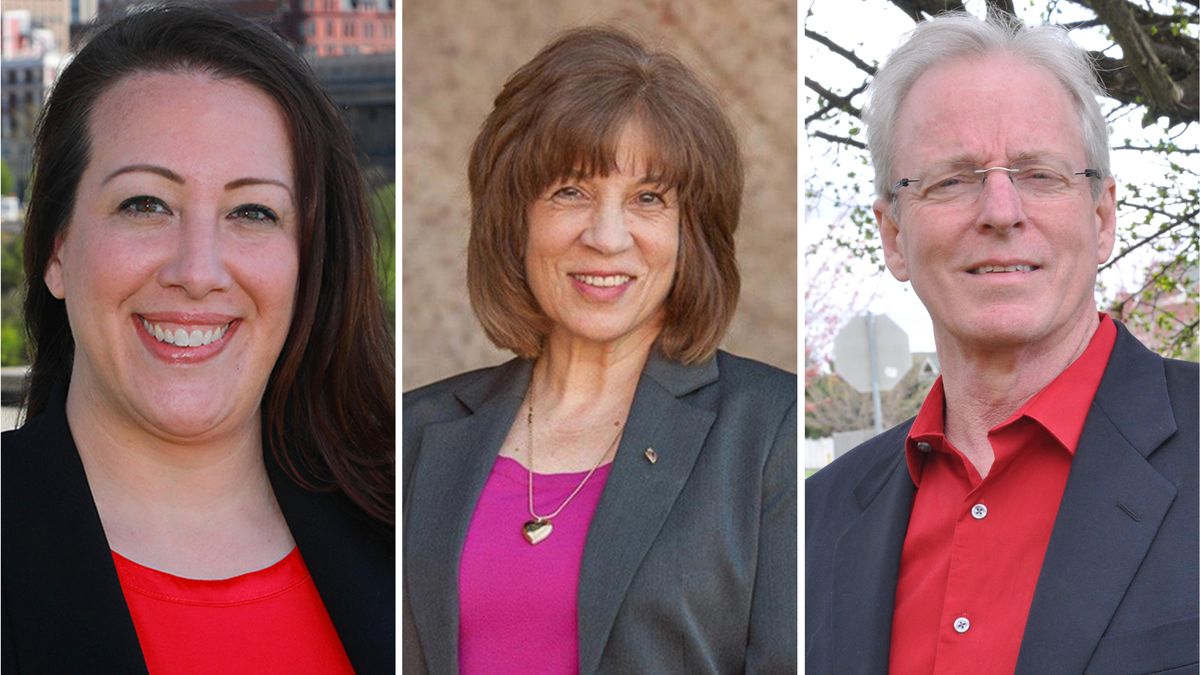Two primary opponents to Lori Kinnear say they would provide a new voice to City Council

A member of the City Council will look to fend off two challengers in the primary race for a Spokane City Council seat representing south Spokane.
Lori Kinnear is seeking a second term, but she faces opposition from real estate agent Liz Fleming and former health care consultant Tony Kiepe.
Kinnear has expressed a desire to continue the work she started in her first term, while Kiepe and Fleming say they would offer a new voice on the City Council.
“Spokane’s come a really long way, and I think it still has a ways to go, and I want to be a part of that solution,” Kinnear said.
Kiepe, a former health care consultant with AristaPoint who is now retired, says he is an answer to a City Council that has drifted too far to the left.
“We need to have some more common sense and be more central,” Kiepe said.
Fleming, who launched a new career in real estate this year after a career in fundraising, wants to see a united City Council.
“It all comes down to building relationships and making sure that we can communicate, listen, make sure that we truly understand where the constituents’ concerns are and how we can bring them forward,” Fleming said.
Public safety and homelessness have dominated the conversation leading up to the primary election in all of the city’s contests, and the city’s south side race is no different.
Neighborhood concerns like property crime are a central part of why Kinnear first got involved in city politics, and she worked in her first term to help reduce property crime rates.
“I was able to work with the administration, police department and fire department as well, so that we could focus on property crime so we could get those numbers down. The numbers are down,” Kinnear said, adding she hopes to continue those efforts.
Fleming has met with law enforcement personnel to get a better understanding of public safety. To her, it starts with bringing together organizations and collaborating to determine “what a safe Spokane looks like,” as well as ensuring law enforcement has the resources it needs.
“It’s definitely a resource issue and making sure we’re appropriating the resources to the area where we’re going to make the most impact,” Fleming said.
That collaborative approach is also necessary to address homelessness, Fleming added.
“It’s looking at how do we manage the homeslessness issue? How do we make sure those folks have the resources we need?” she said.
Kiepe described the homeless situation in Spokane as “out of control.” He said he would support nonprofits that work to address homelessness, but he also argued the city has not seen improved results since he last ran for council in 2017.
“If you have a homeless person, you need to help them out and given them a hand up, but we need to stop giving handouts,” Kiepe said.
Kinnear said efforts are being made to address the issue and the goal is to make it a “rare event” that a person is homeless. However, she noted the results will take time.
“It’s not going to just, snap your fingers, go away. This is a project that we have to keep working on and make sure that what we’re doing is working,” Kinnear said.
Each of the candidates highlighted infrastructure as a top concern.
The city government should be planning for 20 years in the future, Fleming argued, especially given the anticipated growth in Spokane and the implications that growth has for the city’s infrastructure.
“How do we prepare for that and make sure in our budget we’ve allocated the funds to make sure we can keep up with that growth?” Fleming asked.
Kinnear lauded the efficiency of the city’s integrated approach to capital projects, which she says is a “huge savings for taxpayers.” Now, she wants to take that approach beyond the city’s main corridors.
“We need to start doing a deeper dive into our residential streets,” Kinnear said.
Kiepe advocated for a stronger focus on infrastructure improvements in neighborhoods and noted there are streets on the South Hill that are not paved.
“We have citizens paying taxes,” Kiepe said. “We need to have basic infrastructure.”
Kinnear also highlighted her work spearheading a new historic preservation ordinance that allows communities to create an historic overlay district, protecting certain properties from redevelopment. Browne’s Addition is set to apply for such a district, Kinnear noted.
“I want to make sure that other neighborhoods have that opportunity as well,” Kinnear said.
Kiepe said the city is overly restrictive when it comes to housing development and it has issues “because developers’ hands are tied.”
